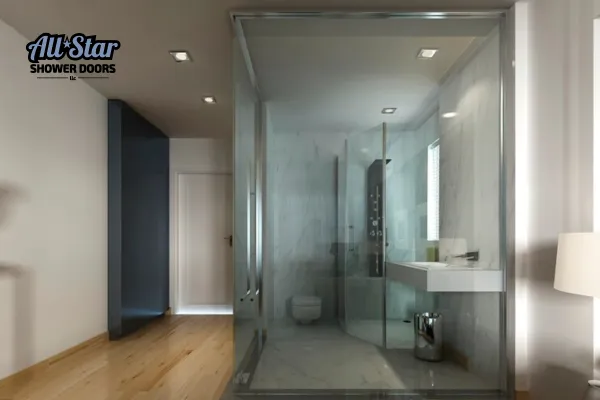
Fixing Noisy Framed Shower Doors: 5 Essential Tips
To fix your noisy framed shower doors, start by identifying the source of the noise. Open and close the door slowly to see if the noise is consistent, checking for any loose parts and tightening screws gently. Inspect the hinges and frame for any damage, and don't hesitate to replace worn-out seals or rollers to ensure smooth, quiet operation. A silicone-based lubricant applied to the hinges can work wonders, and regular checks for rust or debris can prevent further issues. These tips, along with proper maintenance and care, will lead you to a quieter, more serene shower experience, revealing even more ways to enhance your bathroom's tranquility.
Key Takeaways
- Identify the source of noise by checking for loose parts and inspecting the condition of frame and door seals.
- Lubricate hinges with a silicone-based lubricant to ensure a smooth and quiet operation.
- Tighten any loose screws on the frame and hinges to reduce noise levels.
- Replace worn-out rollers, hinges, and seals to maintain quiet functionality and improve door performance.
- Conduct regular maintenance checks, including cleaning tracks and replacing degraded seals, to prevent future noise issues.
Identify the Noise Source
Before tackling the issue, it's crucial to pinpoint exactly where the noise in your framed shower doors is coming from. You might think it's all coming from the hinges, but there's more to consider. Start by opening and closing the door slowly. Listen closely. Is the squeak or screech consistent, or does it happen at a specific point? This helps you determine if the problem is in the hinges or possibly the frame itself.
Next, check for loose parts. Over time, screws in the frame or door can loosen, causing parts to rub against each other awkwardly. Grab a screwdriver and gently tighten them, but be careful not to strip the screws by over-tightening.
Don't forget to inspect the condition of the frame and door seals. Worn-out seals can lead to parts of the door sticking or dragging, creating noise. If the seals look damaged or compressed, replacing them might be your next step.

Lubricate the Hinges
Once you've located the source of the noise, it's time to lubricate the hinges to ensure a smoother, quieter operation. You'll want to start by cleaning the hinges thoroughly to remove any dirt, grime, or buildup that could be contributing to the noise. Use a soft cloth and a mild cleaner, making sure to dry the hinges completely before proceeding.
Next, select a suitable lubricant. Silicone-based lubricants are ideal for shower door hinges because they're waterproof and won't degrade the materials. Avoid using oil-based products, as they can attract dirt and cause more issues down the line. Apply a small amount of lubricant directly onto the hinge, ensuring you cover both the pivot and the moving parts. Use a clean cloth to wipe away any excess to prevent drips.
After applying the lubricant, move the shower door back and forth several times to work the lubricant into the hinge mechanism. This action helps distribute the lubricant evenly, ensuring the entire hinge is coated for optimal performance. You should notice an immediate reduction in noise. If the squeaking persists, reapply a small amount of lubricant and test again. Regular maintenance and lubrication will keep your shower doors operating smoothly and quietly.
Tighten Loose Screws
After lubricating the hinges, it's time to check and tighten any loose screws to further reduce noise from your framed shower doors.
Loose screws can be a primary culprit behind those squeaky, unsettling sounds every time you open or close the doors. Due to daily use and the natural expansion and contraction of materials, screws in the door frame and hinges can gradually loosen. You'll need a screwdriver that matches the screw heads, typically a Phillips or flat-head, depending on your door's design.
Start by examining all visible screws on the door frame and the hinges. Make sure you're supporting the door properly if it feels unstable while you're working. Gently, but firmly, tighten each screw. Be careful not to over-tighten as this can strip the screw holes or damage the frame.
If you notice a screw that keeps turning without tightening, it may indicate a stripped hole. For now, don't worry about replacing parts or making larger repairs. Simply note which parts may need attention in the future.
This straightforward fix can significantly quiet down your framed shower doors. It's a simple step that's often overlooked but can make a big difference in the overall performance and noise level of your shower doors.
Replace Worn-Out Parts
Inspecting and replacing worn-out parts in your framed shower doors can significantly enhance their functionality and reduce noise. Over time, components such as rollers, hinges, and seals may wear down, leading to a less smooth operation and an increase in irritating sounds. You've got to keep an eye out for the telltale signs of wear and tear.
If your shower door is struggling to glide along its track or if you notice a grinding noise, it's likely the rollers are past their prime. Swapping these out for new ones can make a world of difference. Similarly, hinges can become corroded or clogged with mineral deposits from water, causing them to squeak or stiffen. Cleaning them might provide a temporary fix, but if the noise persists, replacement is your best bet.
Don't overlook the rubber seals around the door edges. These can harden and crack over time, not only leading to noise but also potential water leaks. Installing fresh seals ensures a tight, quiet seal when the door closes.

Regular Maintenance Checks
To keep your framed shower doors operating smoothly and quietly, it's essential to perform regular maintenance checks. You've got to stay ahead of the wear and tear that can lead to annoying noises every time you open or close the door. Here's how to do it right.
First, make it a habit to inspect the tracks and rollers every few months. You're looking for any signs of rust, debris, or wear that could be causing friction. If you spot any, don't hesitate to clean them thoroughly with a soft brush and mild detergent. Sometimes, that's all it takes to silence a noisy door.
Next, check the screws and hardware. They can loosen over time, leading to misalignment and, you guessed it, more noise. Tighten everything up, but be careful not to overdo it. Stripped screws won't do you any favors.
Don't forget about the seals and weather stripping. These can degrade, allowing water and moisture to seep through, which not only causes noise but can lead to bigger issues like mold. Replace them as soon as they start showing signs of wear.
Regular maintenance isn't just about preventing noise; it's about extending the life of your shower doors. Stay diligent, and you'll keep those noises at bay.
Frequently Asked Questions
Can the Type of Water in My Area (Hard or Soft Water) Contribute to the Noise My Framed Shower Doors Make?
Yes, the type of water in your area can contribute to the noise. Hard water leaves mineral deposits that can make moving parts of your shower doors noisier when you're opening or closing them.
Are There Any Temporary Fixes I Can Apply to Reduce the Noise Until I Can Perform a Full Repair?
You can use lubricant on the hinges and tighten loose screws as temporary fixes to reduce noise. Applying petroleum jelly may also help until you're ready for a more comprehensive repair.
How Can I Tell if the Noise Is Coming From the Framed Shower Door or Another Part of the Bathroom?
To determine the noise source, listen closely while opening and closing the door. Check for loose parts or unusual sounds elsewhere in the bathroom. It's the best way to pinpoint where the noise's coming from.
Could Adjusting the Water Pressure in My Shower Impact the Noise Level of My Framed Shower Doors?
Adjusting the water pressure in your shower might not directly affect the noise level of your framed shower doors. It's more likely related to the door's mechanics or installation rather than the water pressure.
Are There Any Specific Tools or Protective Gear Recommended When Diagnosing and Fixing Noisy Framed Shower Doors?
When you're diagnosing and fixing noisy doors, you'll need a screwdriver, lubricant, and protective gloves. Safety glasses are also smart to protect your eyes from debris or accidental splashes while you're working.

Conclusion
So, you've tackled that annoying noise from your framed shower doors. You pinpointed the noise, greased up those hinges, tightened any loose screws, swapped out the worn parts, and committed to keeping up with maintenance.
Now, you can finally enjoy a peaceful shower without the irritating squeaks and rattles. Remember, a little upkeep goes a long way, so keep those tools handy.
You've got this, and your serene, noise-free bathroom is proof of your handiwork. Well done!
Ready to transform your bathroom into a luxurious haven? Book a free consultation with All Star Shower Doors today, and let’s design the perfect shower and bathroom space tailored to your style and budget!








